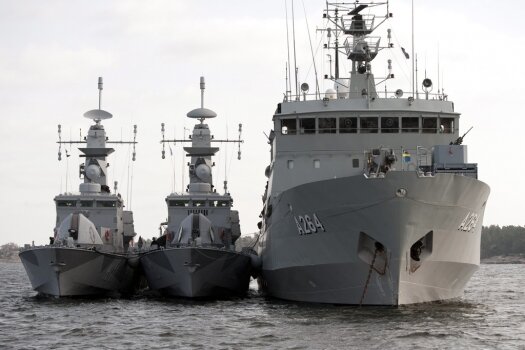Pirate-hunting headquarters (VIDEO)
The EU’s anti-piracy Operation Atalanta fields distress calls from the Gulf of Aden and sees some success.

By Teri Schultz – GlobalPost — NORTHWOOD, U.K. — Almost every day now come reminders of why the European Union made a landmark decision a year ago that Somali piracy was a problem it had to fight.
At the very moment foreign and defense ministers from the 27 member states were considering how best to help counter the problem Tuesday, 28 North Korean crew members were taken hostage with a chemical tanker. The same day, 36 people and their Spanish ship were set free, reportedly at a price tag of over $3 million. Two British retirees are believed to be among some 200 people languishing in pirate custody as the United Kingdom rules out paying ransoms. An estimated 200 more people remain in their attackers’ hands off the coast of Somalia, largely out of the public eye, according to Reuters, which keeps track of the ships in captivity.
The first naval mission in the EU’s history, EUNAVFOR “Operation Atalanta,†was quickly assembled in December 2008, with EU member states contributing ships, planes and helicopters. Its land-based headquarters is hosted by the United Kingdom in Northwood, just outside London.
(Also on Tuesday, the U.S.-flagged Maersk Alabama avoided being hijacked by pirates a second time. See in the video below what one Maersk captain says about his time at Northwood and what he learned about fighting pirates.)
What was envisioned as a one-year effort has already been extended to at least two years. Operation Atalanta has the primary responsibility to protect United Nations food aid shipments to Somalia, but also the larger task of deterring the rampant attacks in the wider Gulf of Aden region against commercial and civilian vessels, no matter the flag they fly.
“We’re not tied to just looking after ships of the European Union,†said Adm. Peter Hudson, EUNAVFOR’s current commander, in an interview at headquarters in Northwood. “We have an obligation to global trade, to all ships operating in the region. We want to deter and disrupt piracy, full-stop, whoever is vulnerable to it.â€
NATO also has a smaller fleet in the area, along with a United States-led coalition and unilateral ships from a number of countries including Japan, India and Iran.
But a look at the numbers would make it seem that deterrence is not working. The International Maritime Bureau (IMB), part of the International Chamber of Commerce, reported that in the first three quarters of 2009, the number of piracy incidents worldwide — 306 — had already surpassed those in all of 2008. This is directly due to the increase in attacks off the coast of Somalia and in the Gulf of Aden, which alone saw more than double the attacks of last year.
But more significant is that the pirates’ success rate has dropped dramatically. One in three hijack attempts were successful a year ago. That figure is one in nine today, according to IMB statistics.
That drop is due in large part to Atalanta, maritime officials attest, both for its interventions at sea and its constant efforts to educate shipowners and crews about how to keep the pirates from scrambling aboard, often by very low-tech adjustments like barbed wire that are remarkably effective.
“It’s possible for a well-handled merchant ship to make it so difficult for the pirates to get on board that they actually give up,†Comm. Adam Peters said from the Joint Operating Center in Northwood.
U.N. resolutions gave Operation Atalanta the right to use all “necessary measures, including the use of force†to stop attacks, but the troops also have the right to arrest the perpetrators if there is enough evidence present to warrant it. Under an agreement with Kenya, the suspects can be transferred into the Kenyan judicial process. A similar arrangement has just been concluded with the Seychelles.
NATO has not managed to make the same kind of deal, leading to frustrating situations in which suspected pirates have had to be released after being captured by NATO warships, drawing criticism from U.S. Secretary of State Hillary Clinton that this “sends the wrong signal†to pirates.
But increasingly, attention is turning to what everyone agrees is the only real solution longterm: changing the situation inside Somalia. Hudson said Atalanta’s role in this at present is “just creating space because the solution will be political, it will be on the ground, for the politicians in Africa, Europe, America, wherever it may be, to come up with alternative strategies.â€
Toward that end, the EU held a pledging conference for Somalia last April where $250 million was promised toward increasing security. And now EU defense ministers have given the green light on a land-based training program for forces that will get them closer to the day they can give the pirates a run for their money.
Atalanta is currently scheduled to run through December 2010, and it’s hardly imaginable the fleet would be brought home then. As Hudson said on the sidelines of an EU defense ministers meeting in Stockholm where his operation was highly praised, “This is not a thing where we can say ‘job done.’â€
___
Source: Global Post
What was envisioned as a one-year effort has already been extended to at least two years. Operation Atalanta has the primary responsibility to protect United Nations food aid shipments to Somalia, but also the larger task of deterring the rampant attacks in the wider Gulf of Aden region against commercial and civilian vessels, no matter the flag they fly.
“We’re not tied to just looking after ships of the European Union,†said Adm. Peter Hudson, EUNAVFOR’s current commander, in an interview at headquarters in Northwood. “We have an obligation to global trade, to all ships operating in the region. We want to deter and disrupt piracy, full-stop, whoever is vulnerable to it.â€
NATO also has a smaller fleet in the area, along with a United States-led coalition and unilateral ships from a number of countries including Japan, India and Iran.
But a look at the numbers would make it seem that deterrence is not working. The International Maritime Bureau (IMB), part of the International Chamber of Commerce, reported that in the first three quarters of 2009, the number of piracy incidents worldwide — 306 — had already surpassed those in all of 2008. This is directly due to the increase in attacks off the coast of Somalia and in the Gulf of Aden, which alone saw more than double the attacks of last year.
But more significant is that the pirates’ success rate has dropped dramatically. One in three hijack attempts were successful a year ago. That figure is one in nine today, according to IMB statistics.
Comments
comments
 Calendar
Calendar






































